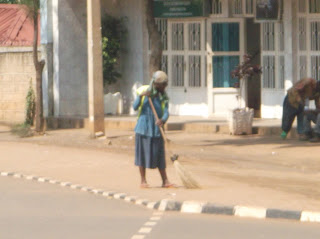 |
| Kigali |
 Another striking impression was
the pride Rwandans seem to have for their country and their president. Our
server at dinner, Clarence, later saw us wandering around the hotel and offered
to show us around Kigali. As we walked, he proudly pointed to the new
construction and quickly noted the old buildings that would be torn down as
the country's Vision 2020 plan was implemented. It wasn't the first time
I'd heard about the plan--or the last. Both Frederick and our driver, Charles, have
spoken of the plan and how President Kagame wanted to “do something special in
Africa,” as Charles put it. Or in Kagame’s words, “As I tell our people, nobody owes Rwandans anything. . . . Rwanda is a nation
with high goals and a sense of purpose.”
Another striking impression was
the pride Rwandans seem to have for their country and their president. Our
server at dinner, Clarence, later saw us wandering around the hotel and offered
to show us around Kigali. As we walked, he proudly pointed to the new
construction and quickly noted the old buildings that would be torn down as
the country's Vision 2020 plan was implemented. It wasn't the first time
I'd heard about the plan--or the last. Both Frederick and our driver, Charles, have
spoken of the plan and how President Kagame wanted to “do something special in
Africa,” as Charles put it. Or in Kagame’s words, “As I tell our people, nobody owes Rwandans anything. . . . Rwanda is a nation
with high goals and a sense of purpose.”There’s also a certain problem-solving ability, a “Rwandan ingenuity” (to hand down an American phrase that no longer seems to fit so well). When a beggar came to our window, the driver explained, “You don’t see many of them anymore. The government has taken them off the streets and sent them to school to learn trades they can use.” I had noticed the same proactive ingenuity about Frederick, who takes what most would write off as a debilitating condition and uses as a way to serve the world.
A certain efficiency happens as a result of this problem-solving approach. The “land of a thousand hills” isn’t what you would think of as a prime agricultural location, but they make it work. They have to. Many of the people depend on crops for food or to trade for other necessities, so they’ve covered their thousand hills with pole beans and coffee, pineapples and potatoes, tea, avocadoes and bananas. (Oh, the bananas!) And I didn't see just a row of banana trees. Surrounding the tall banana trees are smaller plants, such as coffee or beans, to maximize the productivity of the land.
To make this work smoothly requires a great sense of community purpose. Many communities harvest together—not operating under a “yours or mine” method, but a “let’s work together till we get it all done” mentality. We just happened to arrive the day before the entire country came out to put their community approach to work. When we were making plans with our driver, he told us that nothing would be open until about noon on Saturday. Once a month, the whole country closes their businesses and stops what they’re doing for a nationwide clean-up day. We had to see that for ourselves. And sure enough, as we roamed the streets, they were quiet, except for the swish of a broom or the splash of tossed water.
But there’s so much more than that: it’s the people walking—to and from everywhere—with crops and goods on their head--with babies tied on their backs. It’s the fresh, pungent flowers in the hotel lobby and restaurant. It’s the sweet bananas. It’s the way they wave or the children cheer “Umuzungu!” as you pass. (Umuzungu means “white person,” but not in a derogatory way. It’s how we’d say, “There’s George Clooney!” J) It's how they use their horns to communicate what they're about to do, instead of chastising what the other driver did. It’s the way they light up when you shake their hands and bumble out, “Muraho,” the one word you can manage in their language, in their country, while they've spent years learning yours. And the service: let’s just say that if I were to tell the hotel clerk that I’d forgotten my cat, I think he would fly to the United States to get it.
I’m guessing much of that stems from how much these people really love their country. They just want you to leave this country with the same love of Rwanda they feel every day.
And you know, they may just get that wish. They’ve certainly earned it.

2 comments:
Love this pic! And the fact you're gathering everything you went searching for, smells, sounds, sights, tastes - bananas sound delish! You are just like Frederick, the Leo Leoni mouse, not you're Rwandan friend, gathering the suns rays and the colors to share in your stories. I love you sweet friend!
Beautiful picture Amy, just how I pictured you to be! The blog post really made me feel like I was there....tears in my eyes! I can't wait to experience it one day...until then, I"ll keep reading your blog! :)
Post a Comment